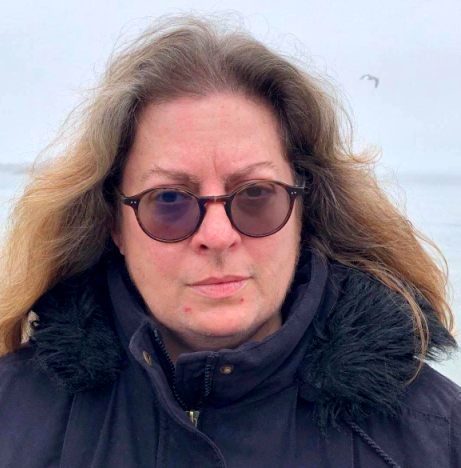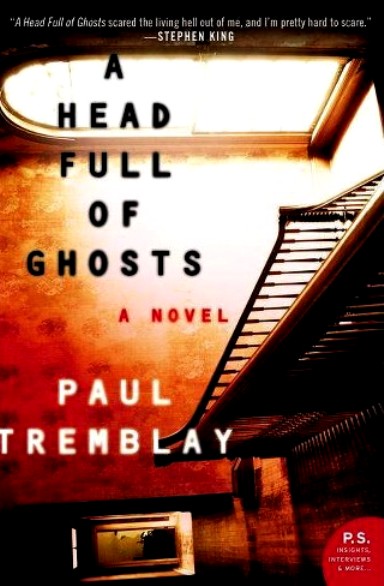

On this month's Special Page:
An exclusive interview with A Head Full of Ghosts author Paul Tremblay
IN THE "SPECIAL PAGE" ARCHIVES:
Joe R. Lansdale
Ramsey Campbell
John McLoughlin
Ray Garton
Jonathan Maberry
Trish Wilson
AN INTERVIEW WITH PAUL TREMBLAY
BY TRISH WILSON
TRISH WILSON: You didn't start off writing horror. You wrote crime fiction like The Little Sleep. What was the appeal of crime fiction and why did you switch to horror?
PAUL TREMBLAY: Well, I did start off writing horror. For the first ten years or so of my writing life I wrote and sold close to fifty horror short stories. But when I tried writing novels, I found that my early attempts weren’t horror but instead dark humor.
The Little Sleep was my first published novel, and honestly, it wasn’t a purposeful pivot to crime. I happened to have an idea for this weird, dark crime novel so I decided to give it a shot. That’s not to say that I don’t like crime fiction, because I do very much. Crime and horror are cousins, I think. Particularly if we’re talking about noir fiction and its doomed characters.
TRISH WILSON: Would you ever consider trying your hand at crime fiction again?
PAUL TREMBLAY: Never say never, but I have no plans to write a crime novel at this time. That’s not to say an idea couldn’t fall into my lap.
TRISH WILSON: Ambiguity features prominently in your fiction. What makes it work for you?
PAUL TREMBLAY: Ambiguity feels real to me. Our memories, identity, and reality itself are much more malleable than we like to believe. I’m interested in the spaces between things, those cracks in the everyday, and that’s one of the places where dread and fear dwell.
TRISH WILSON: You set your crime novel The Little Sleep in Boston. How much research do you do on locations for your books?
PAUL TREMBLAY: Most of my fiction takes place in and around New England, so I generally don’t have to do a lot of research if the story is set there. I feel like I have the rhythm, voices, and feel for life in New England, at least, my little slice of it. I have written stories in other locales, my short story The Ice Tower for example is set in Antarctica, and yes, and when I leave New England, I do research those regions. Mostly online. Thank you, Internet Search Machine maps?
TRISH WILSON: You've edited several short story publications. What would you recommend writers do to grab the reader's attention when writing a short story?
PAUL TREMBLAY: Start the story in the beginning. Not two pages of character X wakes up, goes out for the day, and then bam, something happens. Start with the bam something happens.
Unique voice and/or perspective always grabs me too. Particularly for a short story, you can’t afford to meander and allow the reader to wander off too far.
TRISH WILSON: How did you discover horror and what was the first horror novel you ever read?
PAUL TREMBLAY: My first exposure to horror was movies. When I was a kid there was a local program that played on Saturdays called Creature Double Feature. The first movie was usually a kaiju movie and the second one would be horror, stuff like: Attack of the Killer Shrews, The Brain that Wouldn’t Die, 5 Millions Years to Earth (Quatermass and the Pit).
The first one I read to completion was Stephen King’s The Stand. I didn’t come to reading horror until my early 20’s. The book was a gift for my 22nd birthday. I loved it and was hooked, and have been hooked ever since.
TRISH WILSON: I know you get asked this question often but what was your reaction when Stephen King praised A Head Full Of Ghosts? He remarked, "It scared the hell out of me, and I'm pretty hard to scare." You were already a fan. How long did you do the happy dance when you read his remark?
PAUL TREMBLAY: You mean August 19th, 2015? That night I was home, moving furniture around, and was generally grumpy about it. My phone buzzed with texts and messages from friends who saw Stephen King’s tweet that you quoted before I did. I’m not ashamed to admit that I got teary eyed. That moment remains one of the highlights of my career. Needless to say, I stopped moving furniture, pulled a pack of adult beverages out of the fridge and had myself a one-man party watching the online reaction to the tweet.
TRISH WILSON: After the success of A Head Full of Ghosts, did you find it intimidating to work on a new novel? Did you think, "I scared Stephen King once. Now I have to it again?"
PAUL TREMBLAY: Yes, definitely. Although, I wrote Disappearance at Devil’s Rock before AHFoG was published, or I wrote most of it, anyway. I didn’t think in terms of having to ratchet up scares, but I felt that AHFoG was a good book and it had got me my new book deal so *that* pressure definitely was the ghost in my head (if you pardon the self-indulgent pun). I got through it by gritting my teeth and blindly pushing forward. It was very difficult to do at times. I’m happy with the resulting novel but yeah, it was a hard write.
TRISH WILSON: How did you come up with the idea for A Head Full of Ghosts? I see the influence of Shirley Jackson's We Have Always Lived In the Castle in that book.
PAUL TREMBLAY: In February 2013 I happened to be reading a book of essays on The Exorcist and it kind of hit me that there hadn’t been a possession novel in quite some time. I started thinking about how I would write one? I started with an idea of a secular/skeptical possession novel (that grew to become much more ambiguous). The sister relationship occurred almost instantly as well as the structure of the novel and how it would involve a reality show, etc. Merry is indeed named after Jackson’s Merricat. Less well known, Marjorie is named after the Marjorie in Stewart O’Nan’s The Speed Queen.
TRISH WILSON: Families in crisis figure prominently in your work. What's the attraction for you?
PAUL TREMBLAY: Family dynamics are endlessly fascinating to me, particularly as a parent and a teacher. More specifically, the life of a child or adolescent is something I’m drawn to. Being a kid is one of the few universal experiences that we all share; growing up with that mix of fear and excitement for the future. And from the adult perspective, there’s the anxiety inherent in being a parent or guardian. All of it makes for wonderful fodder for a horror story.
TRISH WILSON: You've written Growing Things and Other Stories, a short story collection. How does writing short fiction differ for you from writing novels?
PAUL TREMBLAY: For novels I typically spend a lot of time planning them out, having the major set pieces in place, before I begin. A short story is typically written over a week or two and the story is the set piece. While a piece of short fiction can certainly have wider consequence and meaning, it’s generally focused on a specific moment. The novel is more prosaic, given more room to roam and bleed out into other stories.
TRISH WILSON: Name some of your favorite books and short stories. How have they influenced your own writing?
PAUL TREMBLAY: Everything I read and watch influences my writing. I try to take or learn something from everything, including the important lesson of what not to do.
Joyce Carol Oates’s Where Are You Going? Where Have You Been? and Stephen King’s The Stand turned me into a reader. Clive Barker’s In the Hills, the Cities is an all-time favorite short story as well. Other favorite novels included Mark Danielewski’s House of Leaves, the aforementioned We Have Always Livee in the Castle, and Kurt Vonnegut’s Slaughterhouse Five. What those books/stories have in common is they opened my eyes to possibility of story; how it could be told and what it could do.
TRISH WILSON: You like to take horror tropes and turn them on their heads. Could you give some examples as to how you've done this and why?
PAUL TREMBLAY: A Head Full of Ghosts is a clear reaction to The Exorcist and horror in general. In that novel I tried to approach the maybe possession as skeptically and ambiguously as possible, while commenting on the tropes of the subgenre by having the characters fully aware of those tropes.
The Cabin at the End of the World is my little riff on the home invasion subgenre. Again using ambiguity, I hoped to ask questions that went beyond the personal and localized horrors happening in the cabin.
TRISH WILSON: What's the deal with pickles?
PAUL TREMBLAY: They are a scourge.
TRISH WILSON: What are your upcoming releases and plans?
PAUL TREMBLAY: I just turned in a yet-to-be-named novel to my publisher, with the plan being to release it July 2020. I await the edits as I type. Other than that, my plan is to nap before school starts in September.
About Paul Tremblay

Paul Tremblay has won the Bram Stoker, British Fantasy, and Massachusetts Book awards and is the author of The Cabin at the End of the World, Disappearance at Devil’s Rock, A Head Full of Ghosts, and the short story collection Growing Things and Other Stories. He is currently a member of the board of directors of the Shirley Jackson Awards, and his essays and short fiction have appeared in the Los Angeles Times, Entertainment Weekly online, and numerous year’s-best anthologies. He has a master’s degree in mathematics and lives outside Boston with his family.
About Trish Wilson

Trish Wilson writes horror with the pen name E. A. Black. She had enjoyed telling scary stories to a captive audience since she was a child. She grew up in Baltimore, the home of Edgar Allan Poe who has inspired her to write.
Due to her love for horror and dark fiction she joined Broad Universe, a networking group for women who write speculative fiction. Her short stories have appeared in Zippered Flesh 2, Zippered Flesh 3, The Horror Zine Magazine Summer 2019, Teeming Terrors, Midnight Movie Creature Feature 2, The Journal of the New England Horror Writers, Heart of Farkness, and more. She won a Best Short Story mention on The Solstice List@ 2017: The Best Of Horror for Invisible, which appears in Zippered Flesh 3. In addition to horror, she writes erotica and romance as Elizabeth Black.
She lives on the Massachusetts coast in Lovecraft country. The beaches often call to her, but she has yet to run into Cthulhu.
Friend her on Facebook and follow her on Twitter, where she posts as Elizabeth Black. Check out her web site at eablack-writer.blogspot.com.


